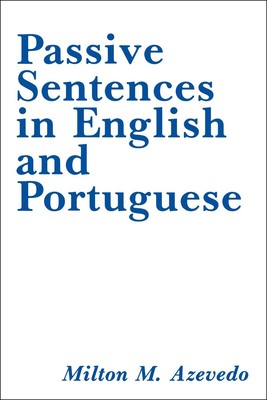
- We will send in 10–14 business days.
- Author: Milton M Azevedo
- Publisher: Georgetown University Press
- ISBN-10: 0878400788
- ISBN-13: 9780878400782
- Format: 16.3 x 23 x 0.9 cm, softcover
- Language: English
- SAVE -10% with code: EXTRA
Reviews
Description
This study analyzes passive sentences in English and Portuguese which result from a post-semantic transformation applied when a nound, which does not play the semantic role of actor, is chosen as syntactic subject. Choice between a passive and its non-passive or active counterpart reflects differences in the distribution of information in the sentence as regards the relative importance of the latter's constituents for communication. Such distribution is analyzed in terms of Praque school theory, especially that involving the notions of communicative dynamism and the distribution of theme and rheme.
The book concludes with a contrastive analysis of English and Portuguese passive sentence patterns which serves as the basis for observations on the teaching of Portuguese passives to native speakers of English.
EXTRA 10 % discount with code: EXTRA
The promotion ends in 19d.05:45:02
The discount code is valid when purchasing from 10 €. Discounts do not stack.
- Author: Milton M Azevedo
- Publisher: Georgetown University Press
- ISBN-10: 0878400788
- ISBN-13: 9780878400782
- Format: 16.3 x 23 x 0.9 cm, softcover
- Language: English English
This study analyzes passive sentences in English and Portuguese which result from a post-semantic transformation applied when a nound, which does not play the semantic role of actor, is chosen as syntactic subject. Choice between a passive and its non-passive or active counterpart reflects differences in the distribution of information in the sentence as regards the relative importance of the latter's constituents for communication. Such distribution is analyzed in terms of Praque school theory, especially that involving the notions of communicative dynamism and the distribution of theme and rheme.
The book concludes with a contrastive analysis of English and Portuguese passive sentence patterns which serves as the basis for observations on the teaching of Portuguese passives to native speakers of English.


Reviews